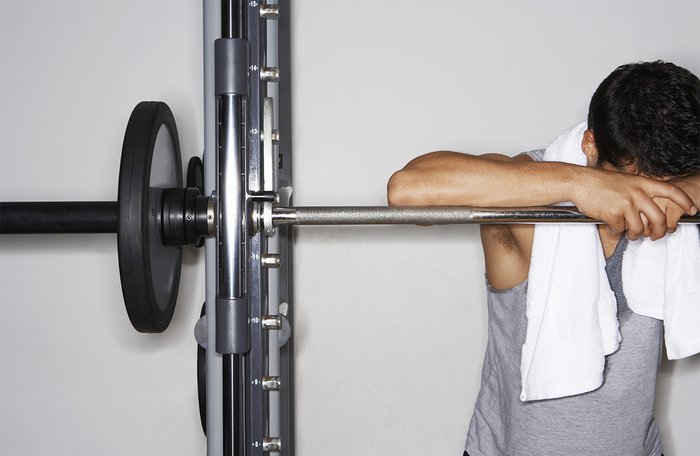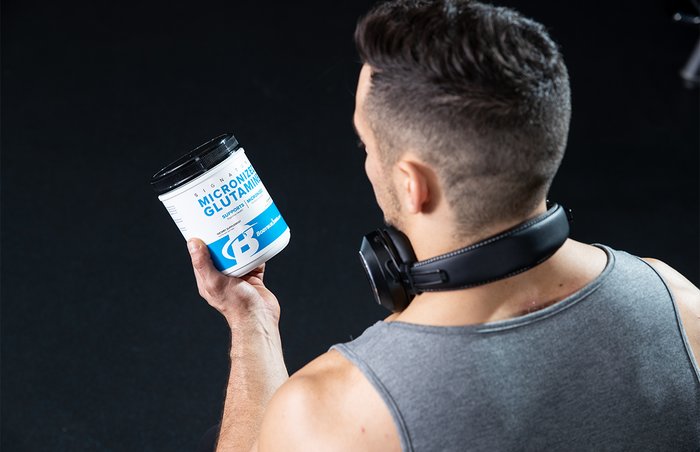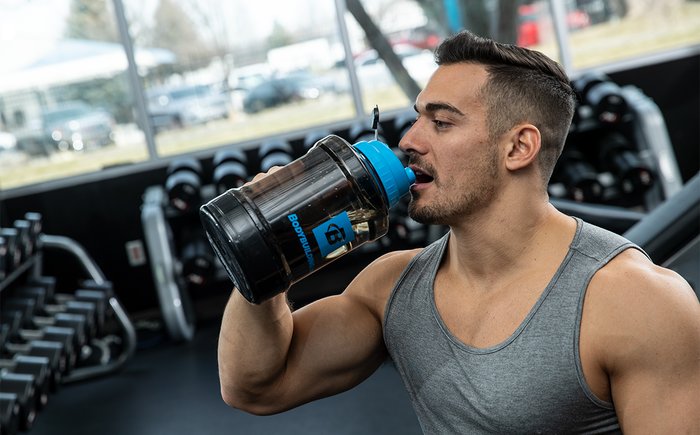The realities of prepping for a physique contest aren't pretty like the bodies you see onstage. Everyone wants all the shreds until they realize the work it takes to get there is not a piece of cake (like the one that has haunted you and your taste buds day and night).
Two members of Team Bodybuilding.com, Abel Albonetti and Brian DeCosta, both competed in shows recently, and in light of their success, they want to share a bit of truth with you: Years of training and experience doesn't necessarily make the prep easier. You may think otherwise based on the drive and positivity they exhibit on social media, but that's a whole other component of doing the prep.
"You can't be thinking it's going to be easy. A lot of people think that, and they're the people who never look the way they should have," says Albonetti, who recently took place third in his men's physique class at the NPC Adela Garcia Classic.
Let's be clear. This is not to deter anyone from competing if they are considering it, but it can be helpful to know what's on the horizon so you can prepare for the uncontrollable factors and accept what is inevitable as a bodybuilding competitor.
Here are Albonetti and DeCosta's biggest tips and things to be aware of during contest prep:
1. Be OK with Feeling Like Crap
"The unavoidable reality is that you're going to have to deal with low energy, low mood, brain fog, and feeling like a dumb, muted, 70-percent version of yourself," says DeCosta, who recently competed at the INBF Natural Muscle Mayhem contest.
It can seem bearable until you reach that point a few weeks in, but with proper guidance you can combat it. Good coaches will help set these expectations so that one, you aren't surprised when it happens, and two, they can be a reliable voice when you need to get talked off the ledge.
DeCosta says he sees people fall off the wagon all the time because they don't see it coming and the hunger and low energy catch them by surprise. This goes for the gym and your workouts, too.

"You're not going to be as strong and you're not getting a pump every time," he says. "Give it what you've got, but know that your performance isn't going to be up to par."
Abel Albonetti, one of the most gym-addicted guys around, admits that even he struggles with motivation to get in the gym during contest prep. It's easy in the beginning, when the results come a little quicker and easier.
"I love working out—I love the feeling you get—and when you're in contest prep, the first four weeks is not that bad. The last 4-6 weeks, though, you kinda suffer through all of the workouts, and, frankly, they suck," he says. "You just have to make yourself get in there and start working out. Just know it's normal."
2. You're Probably Not Going to Look the Way You Want
DeCosta has also noticed that individuals who diet down will often be convinced that they're losing muscle and size when that's not necessarily the case. There's just not a lot of water and carbs in their system. Until the system is replenished, you have to accept the flat and even soft look of your muscles—and don't let your warped mind get the best of you.
"There's this rule of thumb that my coach shared with me, and I find it to be true: The worse you look in the middle of your contest prep and toward the end, the better you're going to look onstage," DeCosta says. "You may not look the way you want until the week of the show or even show day if you do it right."
Albonetti has noticed the same thing, in both advanced competitors like himself and beginners alike, panicking over how they look. So they stray off plan and try to adjust things when they shouldn't. If you have a good coach, you have to continue to stay on track with their protocol.
"You're working super hard, doing a lot of cardio, and then you look in the mirror and you don't look as good as you looked last week. You're more deflated and flatter," he says. "But you have to trust the process. It's a mind game that you have to work past."
3. Set Yourself Up to Win
Now we're talking the little details. You want to win? You have to pay attention to the small things.
"I put all my Signature supplements in a pill container ahead of time or in my gym bag. I always know where they are and make a habit of taking them at the same time every day," DeCosta says.

Sleep is another area where it's easy to skimp, but when you do, it can set you back hard in terms of recovery and fat loss. DeCosta schedules sleep the same way he schedules everything else. When your life is in order, or at least the parts that are in your power, it's easier to give the majority of your brain power to the contest prep.
"Keeping a calendar for life in general makes a huge difference," he says. "I loosely schedule meals since my days can vary, but because I meal prep, they're ready for me when I need them, and I have no excuse to skip."
4. Keep Busy in Your Free Time
It's easy to let your mind wander to what your next meal will be—or all the desserts and pasta you can't have for the time being. When you're at work or the gym, you're preoccupied with things to do, so it's important to keep yourself busy in your off hours, too.
"For me, it's working on editing or doing anything out of the house, even if it's just to go get coffee," Albonetti says. "It's still going to be hard, but that's to be expected. Just keep your mind occupied where you can and focus on your workouts."
As with life in the off-season, there is still such a thing as having a schedule that's too packed. Rest is key to recovery, which you're already going to be struggling with.
"You have to find a balance because being too busy can raise stress and cortisol," DeCosta says. "This is where self-awareness comes in—know what 'too much' is on your own plate. Replace your sitting time, where thoughts about eating would come, and go for a walk. Have a creative outlet. Spend time with friends."
5. Lean into Higher Rep Ranges
Albonetti points out that you want to lift as heavy as you can for as long as you can to preserve muscle, but in a cut, you are going to lose strength.
"I'm constantly trying to keep my size and going heavy, but when I'm a few weeks out, I will start to incorporate more circuit workouts with 15-20-rep sets in the mornings instead of cardio," he says. "It doesn't replace my normal workouts later, but it can help burn calories and still activate those muscles rather than just walking on the treadmill."
DeCosta has also found mental reinforcement in playing with higher reps, prompting the feeling of a better workout when he can't lift as heavy as he would normally like.

"Doing 15-20 reps is better for muscular and cardiovascular endurance. It definitely helps me get a good sweat going. You also risk injury if you're trying to lift the same amount of weight you do when you've got more body fat on your frame," DeCosta says.
Sometimes DeCosta goes to the gym with the goal of just having a fun workout with tons of reps. This gives him a boost of confidence and lights that motivation again by stimulating his muscles in a new way. And speaking of new muscle stimulation…
6. Don't Be Afraid to Mix Up Your Workouts
The end goal of a contest prep is fat loss, right? It doesn't matter how you do it as long as you're doing what you need to build the body you need to win onstage. That's why DeCosta recommends switching up your workouts when your brain is feeling burnt out.
"Regardless of how you do it, the fact that you're working the muscles at all is the good thing. So, if you're not enjoying your training, switch it up. But keep the intensity high and hit all the muscle groups," he advises. "I think the fun you're allowed to have on the training side and not being as regimented there makes it easier to be more regimented on the nutritional side, which ultimately is the most important."
Albonetti points out that this doesn't mean you should try a whole new style of training from what you've done in the past. Mixing in the higher reps, as mentioned above, is still weight training, but don't toss out what has been working for you.
"You need to keep doing what you've been doing the past few months—you know, what has been helping you build size—and just let the cardio and the diet be what gets you leaner," he says.
7. Peak Week Is Not the Time to Mess Around
Peak week can be one of the trickiest parts about the contest prep process. Sadly, the wrong moves can make or break your look onstage. If you're new, it may take a few shows before you figure out exactly what works—and each show can be different, too.
"If I'm going to a show and I'm not as lean as I was a show before, I won't eat as many carbs going into it," Albonetti says. "If I go in not super shredded, my body absorbs anything I eat and spills over. But if I go in there with great conditioning, more food benefits me. Honestly, it's only been maybe 3-4 times that I've actually been that sick lean that I've been able to eat a burger the night before and then look better."
He explains that beginners should avoid carbing up, something you hear a lot of professionals recommend. When you're that new to it, it's likely you won't get as lean as you should.

"When I was younger, I was like, 'Oh, yeah, I'm gonna follow this guy's peak week protocol.' So I'd go eat 500 grams of carbs, deplete for four days like what they said to do, and then I'd go Thursday and Friday before the show and eat 500 grams of carbs on both days and all of a sudden go into the show looking worse than I did a week ago," Albonetti says.
8. Have a Bigger Why
You've heard the clichés before—"Do it for you" and "Find your why" are a couple of popular ones. It sounds like a bunch of BS, but it isn't until you're in the throes of show prep that you realize just how handy this mindset can be.
"I film every single workout and all of the sets," DeCosta says. "When I show up at the gym and I'm lacking motivation, my thought is, 'I'm going to be posting this workout for thousands of people to see. I'm going to give this my effort.'"
Holding yourself accountable is a huge component to this, as well. If it takes just having a date on the calendar to help you stick with something, so be it.
"You have to have a deadline and a date and a time of that day," says DeCosta. "If you don't, and you haven't shared your goal with people, you will in a time of low discipline be like, 'Eh, I'm not committed anyway.' Don't be that person."
How do competitive bodybuilders train in and out of show prep? Hop on one of Abel Albonetti's 30-Day workout programs to find out, available only on Bodybuilding.com BodyFit Elite.



